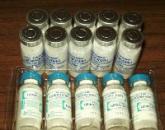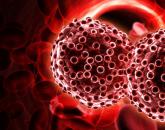When can you not do without antibiotics? Antibiotics for sinusitis: effective and inexpensive.
Sinusitis is an inflammation of the mucous membrane lining the maxillary sinuses. It often occurs during infectious processes in the nasopharynx. Early detection and treatment will avoid possible complications. In some cases, antibiotics are indicated for sinusitis.
Maxillary sinuses are located in the upper jaw on the sides of the nose. They are connected with a hole in the middle nasal passage and are lined with mucous membrane. The infection penetrates the sinus from the nose or through the blood.
Predisposing factors for sinus are: a violation of the normal structure of the upper respiratory tract (an increase in adenoids, turbinate hypertrophy, septum curvature), incomplete or incorrect treatment of viral and bacterial infections, diseases of the molars of the upper jaw, reduced general and local immunity.
Depending on the reason, there are types of sinusitis:

Often the first symptoms of sinusitis appear a few days after suffering an infectious disease. The patient has the following symptoms:
- The nose is stuffed up, the sense of smell is reduced.
- The discharge may be clear, but usually purulent, yellow-green. In chronic course they are thick and difficult to get out of the sinuses, so they may be absent.
- Feeling of pressure, pain, in this area, which increases with leaning forward. With bilateral sinus, pain all over the face.
- The temperature is slightly above normal (subfebrile), it can rise to 39 degrees and above.
- General phenomena (fatigue, weakness, headaches, sleep disturbances).

Sinusitis
Diagnosis and treatment methods
When diagnosing, it is necessary to find out which infectious and allergic diseases the patient has suffered recently (colds, runny nose, allergies, removal or treatment of teeth). During the inspection can be detected purulent discharge at the orifice of the maxillary sinus.
Other symptoms of sinusitis - pain in the area maxillary sinuses when pressing or tapping.
Additionally carried out radiography. On the radiograph, the sinuses are darkened, which indicates inflammation of the mucous membrane and purulent exudate in them. Punctures of the maxillary sinus are made, but at present this method is rarely used, due to possible complications. In order to select the appropriate therapy, it is necessary to make a bacteriological smear analysis and determine the sensitivity to drugs.
In the treatment of antritis it is necessary to destroy the infection, improve the outflow from the maxillary sinuses, relieve the symptoms of inflammation and increase immunity. Therefore use:

Antibiotic therapy
In which case you can prescribe antibiotics for sinus, the doctor decides.
If antritis is caused by a virus or a fungus, antibiotics are not advisable because antibiotics are not effective against them. And in the case of fungal infections, they are contraindicated.
The liver is the main organ of the human body, taking the most active part in the transformation of drugs taken by man. That is why so it is important to protect your liver from adverse effects after or during involuntary administration of antibiotics with ...
Antibiotics destroy pathogens and inhibit their further reproduction.
Types and forms of antibiotics
Antibiotics are produced in the form of tablets, capsules, solutions for intramuscular and intravenous injections. There are also nasal drops and sprays for local exposure. A variety of antibiotics can affect bacterial cells. Depending on the chemical formula and action on pathogens, for sinus are used:

When prescribing antibiotics, sensitivity to them, determined during sowing, should be taken into account. If after receiving for three days the patient's condition does not improve, you need to replace it. Bacteria can be resistant to it.
Important: An otolaryngologist prescribes antibiotics for sinusitis. It is necessary to strictly adhere to the recommendations of the doctor.
You can not stop taking, if the patient feels better, it can lead to a chronic course of the disease. The minimum course is 5-7 days.
Treatment for adults
Treatment of acute sinusitis in adults is carried out with penicillin antibiotics. In order to determine the sensitivity to antibiotics, use the data obtained in the study of smear. It can be done quickly enough. What antibiotic to appoint, prompted by the color of Gram.
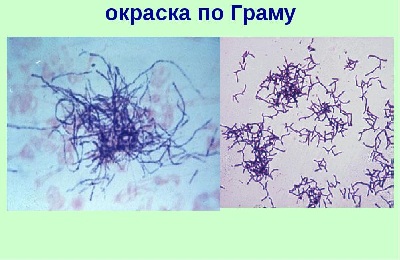 Bacteria are colored blue or red. Red - gram-positive, and blue - gram-negative. When sinusitis is more often found gram-negative bacteria. The most effective antibiotics against them are Amoxicillin with clavulonic acid (trade name Amoxiclav, Augmentin), Ampicillin, Cefaclor, Cefalosporins.
Bacteria are colored blue or red. Red - gram-positive, and blue - gram-negative. When sinusitis is more often found gram-negative bacteria. The most effective antibiotics against them are Amoxicillin with clavulonic acid (trade name Amoxiclav, Augmentin), Ampicillin, Cefaclor, Cefalosporins.
Amoxicillin shows good efficacy in sinusitis, so it is prescribed before receiving a response to sensitivity to antibiotics. The daily dose is 80 mg / kg. The medicine should be drunk 2 times a day after meals. Ease of use and safety allow them to treat both adults and children.
Augmentin and Amoksiklav called protected penicillins, they include clavulonic acid, which increases the resistance of the drug. Augmentin is active against gram-negative and gram-positive microbes.
 If you are allergic to penicillin antibiotics, you can assign macrolides (Azithromycin, Clarithromycin). For antritis in adults, Clarithromycin is recommended to be taken in a dosage of 500 mg twice a day. Dosage in children is calculated by body weight and is 7.5 mg / kg. Azithromycin is longer excreted from the body, so it needs to be drunk only once a day for five days. The first dose is 500 mg, then 250 mg each.
If you are allergic to penicillin antibiotics, you can assign macrolides (Azithromycin, Clarithromycin). For antritis in adults, Clarithromycin is recommended to be taken in a dosage of 500 mg twice a day. Dosage in children is calculated by body weight and is 7.5 mg / kg. Azithromycin is longer excreted from the body, so it needs to be drunk only once a day for five days. The first dose is 500 mg, then 250 mg each.
For poor treatment of sinusitis, cephalosporins are prescribed in tablets or injections (Cefuroxime, Ceftriaxone). Cefuroxime tablets are effective against most pathogens for sinusitis. They need to take 7-10 days, 250 mg 2 times a day.
Treat sinusitis better pills, but when it is caused by resistant strains (nosocomial infection), parenteral administration of cephalosporins (Ceftriaxone) or amino-picosides (Gentamicin) is necessary. Their therapy is carried out under the supervision of a physician, due to the high risk of complications, especially in children.
Parenteral administration is also indicated if patients have a stomach ailment, or a drug that is sensitive to sensitivity, does not have tablet forms.
Treatment for children
Therapy for sinusitis in pediatrics has its own characteristics. The maxillary sinuses in children are small, shallow, and when applied topically, antibiotics penetrate well into them. And since many antibiotics can have an adverse effect on the child’s body, sprays and aerosols are often used in therapy along with pills. They are produced in the form of inhalers for spraying into the nose. The course of treatment is 5-7 days.
Review of our reader - Maria Ostapova
Recently, I read an article that said that you need to start treating any disease with a liver cleanse. And talked about the tool "Leviron Duo" to protect and clean the liver. With this drug you can not only protect your liver from the negative effects of taking antibiotics, but also restore it.
I was not used to trusting any information, but I decided to check and ordered the packaging. I started to accept and noticed that the strength appeared, I became more energetic, the bitterness in my mouth disappeared, I left discomfort in the stomach, improved complexion. Try it and you, and if anyone is interested, then the link to the article below.
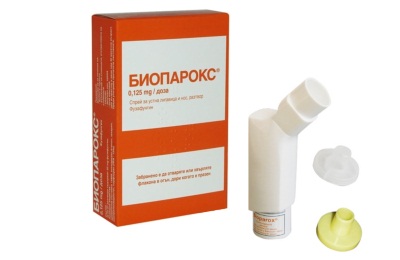 The most frequently prescribed Bioparox, analogues - Fusafungin, Hexoral. Isofra spray is also used in the treatment of sinusitis. But it contains an antibiotic related to aminoglycosides, so it should be used with caution.
The most frequently prescribed Bioparox, analogues - Fusafungin, Hexoral. Isofra spray is also used in the treatment of sinusitis. But it contains an antibiotic related to aminoglycosides, so it should be used with caution.
Rinse the nose before spraying. This will increase the area of contact of the drug with the mucous membrane, and the medicine will act more effectively. Low absorbability in the blood reduces the possibility of complications of the kidneys and liver.
When sinusitis in children do not prescribe a group of fluoroquinols, they cause changes in the cartilage tissue of the growing organism.
Use of natural antibiotics
Many medicinal herbs contain substances that act on bacteria as natural antibiotics. They can be used for adjuvant treatment of sinusitis. A good effect on antritis was observed when applying onion juice and garlic, fir, pine and cedar oil, Kalanchoe juice, beetroot and chamomile or infusion.
 Infusions and decoctions of medicinal herbs wash the nose - it improves the outflow from the maxillary sinuses. You can make a wick (turunda) from gauze, soak it in infusion and insert it in the nasal passage for 4–5 minutes, then remove and replace it with a new one. The procedure is carried out several times a day. During the procedure, it is desirable to lie on the opposite side of the process. The exudate from the maxillary sinus under the action of osmotic pressure comes out easier.
Infusions and decoctions of medicinal herbs wash the nose - it improves the outflow from the maxillary sinuses. You can make a wick (turunda) from gauze, soak it in infusion and insert it in the nasal passage for 4–5 minutes, then remove and replace it with a new one. The procedure is carried out several times a day. During the procedure, it is desirable to lie on the opposite side of the process. The exudate from the maxillary sinus under the action of osmotic pressure comes out easier.
Natural antibiotics can be used as nasal drops. Many of them have not only anti-inflammatory, but also vasoconstrictor properties. If you do not have individual intolerance, then decoction of chamomile, St. John's wort, aloe juice, Kalanchoe or onion is instilled into the nose 3-4 times a day.
Tip: You can prepare a mixture of a tablespoon of honey and Vishnevsky ointment, add one tablespoon of juice Kalanchoe, onions and cyclamen. Wrap in cheesecloth and put on the nose, hold for 15–20 minutes. Carry out the procedure 2 times a day.
There are many different recipes that include natural antibiotics.
 Nature has created substances that can help treat sinusitis and improve the overall immunity of the body. But you need to remember that sinusitis can lead to serious complications (meningitis, sepsis, orbit abscess).
Nature has created substances that can help treat sinusitis and improve the overall immunity of the body. But you need to remember that sinusitis can lead to serious complications (meningitis, sepsis, orbit abscess).
It is necessary to treat sinusitis under the supervision of a physician, and the best antibiotic for antritis is the one to which, when bacteriological culture is greatest. Do not stop taking antibiotics if the symptoms of the disease quickly disappeared. It is necessary to conduct a course of therapy completely to avoid the transition of antritis to the chronic form.
Your body tends to be healthy, help him with this!
Do you and your family are very often sick and treated with antibiotics alone? Tried a lot of different medicines, spent a lot of money, effort and time, and the result is zero? Most likely, you treat the effect, not the cause.
Weak and lowered immunity makes our body UNSECURE. It can not resist not only infections, but also pathological processes, causing tumors And cancer! If you know firsthand:
- frequent respiratory catarrhal and viral diseases;
- ARVI with long and heavy current;
- persistent pustular skin lesions;
- increase lymph nodes;
- fungal infection of the nails, skin and mucous membranes (onychomycosis, candidiasis);
- tuberculosis infection in any forms and manifestations;
- resistant to treatment and constantly recurrent diseases of the respiratory tract, nasal sinuses, urinary system;
- poor wound healing;
- general weakness, chronic fatigue.
We urgently need to take action! That is why we decided to publish an exclusive interview with Alexander Myasnikovin which he shares penny method immunity enhancement.
Sometimes a mild cold due to lack of treatment can turn into a more severe form of the disease. Against its background, sinusitis often develops and there is no longer enough to do without antibiotics. Some patients begin to be treated on their own, which is very dangerous. To get better quickly, you should go to see an ENT doctor. He will prescribe a competent treatment, with which you can quickly recover.
What is sinusitis?
This disease is caused by acute sinusitis. Inflammation of the paranasal sinuses occurs. These symptoms were first described by English scientist Haymor several centuries ago, hence the name of the disease.
According to statistics, almost every tenth adult suffers from sinusitis in acute or chronic form. Among the children's population, this disease is also common. Most often, children have sinusitis after ARVI.
The maxillary sinus is the largest of sinuses. It is located in the thickness of the body of the upper jaw. In a healthy person, the maxillary sinuses are sterile. The quality and quantity of mucus in the maxillary sinuses can be filled with pathogenic bacteria during the inflammatory process.
Hostile microbes, penetrating into the maxillary sinuses, quickly begin to multiply in the mucosa. A defensive reaction occurs and the sinuses begin excrete large amounts of mucus. The result is swelling. Because of microbes, there is an increase in body temperature. The ducts become blocked and it becomes difficult to breathe through the nose. An infection of the sinuses occurs due to the infection.
Most often this occurs during the cold season, during the activation period respiratory diseases. Often, patients have sinusitis after complications in the form of complications. This is a dangerous and painful disease, because the infection can go to the nearest organs.
- eyes;
- brain.
If sinusitis is not treated, serious complications can occur, which will lead, for example, to hearing loss.
Symptoms and forms of the disease
 Among sinusitis, sinusitis takes the leading place. The main manifestation of this dangerous disease is pain in the projection area of the sinus whining character. It can also move to the ear. When edema of the mucous membrane occurs breathing through the nose. Gradually the swelling moves to nasal cavity. The patient manifests discharge, which may be of a different nature. It depends on the type of bacteria that caused the inflammation. Against this background, the patient often has a fever.
Among sinusitis, sinusitis takes the leading place. The main manifestation of this dangerous disease is pain in the projection area of the sinus whining character. It can also move to the ear. When edema of the mucous membrane occurs breathing through the nose. Gradually the swelling moves to nasal cavity. The patient manifests discharge, which may be of a different nature. It depends on the type of bacteria that caused the inflammation. Against this background, the patient often has a fever.
There are two main forms of antritis:
- catarrhal - almost always begins to develop during supercooling, so it is easy to cure, using vasoconstrictor agentsdue to this it passes quickly;
- purulent - is a severe form of the disease, as it develops due to the penetration of microorganisms into the sinuses cavity. If you do not treat such sinus, he quickly turns into a chronic disease.
After diagnosis, the specialist prescribes treatment, given the form of sinusitis. For the full recovery of the body, maintenance treatment is carried out with the use of various drugs, including antibiotics for sinusitis.
Sinusitis: Antibiotics
Effectively get rid of inflammatory process antibiotics will help. Immediately the question arises, what antibiotics should be used to get rid of antritis as soon as possible? Choosing the best drug, the doctor considers:
- symptoms of the disease;
- severity of sinusitis;
- features of the patient.
If the sinusitis was caused by bacteria, then antibiotics are used to inhibit the activity of disease-causing agents. When the disease is provoked by fungal infections, the antibiotic fusafungin is usually prescribed. This is a unique drug with a wide spectrum of action. It effectively affects all bacterial and pathogens.
Antibiotics for antritis in children and adults are used topically in the form of drops and sprays in the nose, as well as for general treatment in the form of tablets. Intramuscularly and intravenously prescribed in the form of injections. This method is one of the main in the treatment of sinusitis.
The duration of taking antibiotics from sinusitis always depends on the degree of development of the disease, the general state of health and the type of antibiotic. If after taking the drug for 5 days, the condition does not improve, it is necessary to change the medication. In chronic form, attention should be paid to the previous antibiotic used for treatment. If he helped a little, then you need to apply another.
Since antibiotics are the most allergenic in treatment, it is very dangerous to select them yourself. This should be done by the doctor after admission and diagnosis.
always chooses ENT doctor. There are many types of antibiotics for the treatment of sinusitis in adults and children. These include: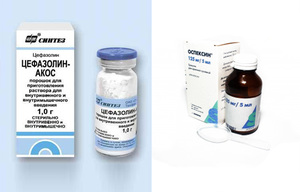
Now we will look at these groups of drugs in more detail, in order to become familiar with the properties and effects of the most popular remedies in the treatment of sinusitis.
Review of the most used antibiotics
Biseptol is not an antibiotic, although it has a powerful antimicrobial and antibacterial action. For this reason, it is often prescribed for the treatment of sinusitis in combination with cephalosparin preparations. Biseptol well eliminates infectious and inflammatory processes of the respiratory organs, and is also used in otitis and rhinosinusitis. The dosage of the medicine depends on the age of the patient and children under 3 years of age cannot use it. The drug is available in two forms:
- pills:
 Azithromycin active drug against gram-positive and gram-negative bacteria. Most often produced in pill form. For children there azithromycin in suspension for oral administration. Depending on the condition of the patient, adults and children are prescribed for a period of 2 to 5 days, taking into account the condition of the patient.
Azithromycin active drug against gram-positive and gram-negative bacteria. Most often produced in pill form. For children there azithromycin in suspension for oral administration. Depending on the condition of the patient, adults and children are prescribed for a period of 2 to 5 days, taking into account the condition of the patient.
Cefazolin has a wide range of antimicrobial action. It is produced in the form of powder for injections from sinusitis and other diseases. Cefazolin tablets are also available, but are rare in this form of release. When sinusitis in children and adults, it should be taken 1-2 weeks. Compared to other drugs of this group, it is less toxic, which is very important in treating a child.
Ceftriaxone is a penicillin derivative. Doctors often prescribe it for the disease of the nasopharynx. It effectively helps not only in the treatment of sinusitis, but also for sore throat and other serious infectious diseases. The tool suspends the further development of dangerous bacteria and gives high performance in treatment. It is often used to suspend the acute phase of the disease, since it most effectively fights against sinus microbes.
Augmentin has a bactericidal effect. This is a modern drug, it is quite complex, but has a wide spectrum of action. It can be used to treat adults and children. A child under 1 year old must be counted taking into account their weight. The drug is prescribed 10 days after the onset of the disease, if the symptoms persist. Means is used inside.
Even the most effective antibiotics. do not assign yourself. At the first signs of the disease it is better to immediately contact an ENT specialist and then the treatment will give a positive result.
Sinusitis is an inflammation of the paranasal sinuses, which in most cases is a consequence of acute sinusitis.
The name of the disease comes from the name maxillary sinuses nose, which are affected by the inflammatory process - maxillary.
For the first time, the symptoms of pathology were described several centuries ago by English scientists by the name of Gaymor, hence the name.
Among adults, about one in ten people suffer from acute or chronic sinusitis - these figures provide an idea of the prevalence of this pathology and understand the importance of finding the best remedy for sinusitis.
More than 10% of cases of ARVI are diagnosed as a result. acute sinusitiscaused by joining bacterial infection and related complications.
Considering that an adult infected with ARVI approximately once a year, we can say that everyone has sinusitis at risk. And the latest static data on sinusitis - this pathology is in fifth place in the list infectious diseasesto be treated with antibiotics.
What antibiotics are used - how to choose a medicine
Exist general principlesBy which the doctor is guided, selecting the best antibiotics for antritis for adults.
It cannot be said that this medicine is the best antibiotic for antritis, and it will certainly help everyone and everyone, like mucolytics. First of all, the symptoms of the disease, the degree of their severity, the patient's features are evaluated.
All antibiotics that can be used to treat sinusitis in adults are divided into three broad categories.
First line drugs
This includes those antibiotics for antritis, which are most effective for antritis and are the drugs of choice. They are prescribed to adults in the first place. It:
- Clarithromycin.
- Azithromycin.
All these antritis pills are usually well tolerated and give excellent results with timely and proper useas mucolytics.
Second-line drugs
Drugs from this group of antibiotics are prescribed if the patient lives in a region that has a high incidence of diseases of the upper respiratory tract caused by resistant microorganisms. They are prescribed for adults if the symptoms of sinusitis have not disappeared after a course of therapy with first-line antibiotics.
This group includes such tablets for antritis:
- Amoxicillin / Clavulanic acid;
- Fluoroquinolones;
- Cephalosporins of the 2nd and 3rd generation.
With such drugs can be treated both chronic and acute sinusitis.
Injections for sinus
There is a separate category of patients with so-called nosocomial sinusitis. In this case, the tablets for antritis of antibacterial action are not effective, antibiotics should be administered intravenously. Injection prescribe these drugs:
- Meropenem.
- Imipenem.
- Cefuroxime.
- Cefotoxime.
- Ceftriaxone.
- Gentamicin.
- Tobramycin.
Each of these drugs has its own peculiarities of the effects on the body with sinus, they need to be taken in different dosages and according to different schemes.
Therefore it is worth examining in detail each of them in order to understand when and which is best to treat sinusitis.
Penicillins in the treatment of sinusitis
Therefore, when an otolaryngologist writes a prescription for antibiotics in liquid form for injections, assuring that this is the only way to combat a sick illness, the patient agrees without thinking, takes the prescription and obediently goes to the pharmacy.
The duration of the course of treatment with injections is the same as the therapy with antibiotics in pills - from 7 to 10 days. And the result is usually noticeable. But while the side effects in most cases are so large and serious that after the treatment of sinusitis, you have to go to the treatment of other internal organs and restoration of completely destroyed immunity.
So do antibiotic injections for sinusitis be necessary? Yes, there are situations when you really can't do without them. Parenteral introduction antibacterial drugs indicated for acute nosocomial sinusitis. The causative agents of the inflammatory process are predominantly Gram-negative microorganisms with high resistance to antibiotics.
Aminoglycoside antimicrobial agents are active against bacteria of this type. In this case, empirical assignments are inexpedient, it is imperative to make a culture of cultures to identify the sensitivity of bacteria, and then select an antibiotic from the results.
In conclusion, we offer an informative video about antibiotics for sinusitis.
Children's sinusitis (inflammation of the maxillary sinus "maxillary" sinuses) has a distinctive feature from an adult.
In childhood, all the mucous membranes are very loose, and the nasal passages are quite narrow. Due to these physiological features, the withdrawal of mucus from the child's nasal passages is difficult, and therefore the pathogenic bacteria multiply and grow faster in the ideal environment for them.
Therefore, sinusitis, if such a diagnosis is made by a doctor and confirmed laboratory, you need to begin treatment as soon as possible. Moreover, when asked if antibiotics are necessary for antritis, the answer is almost always positive.
Why are antibiotics for antritis?
The first 5-7 days, doctors will try to treat the child without the use of antibiotics, provided that you applied to the clinic in time, and the stage of the disease is not running. If there is no improvement, it is mandatory to prescribe antibiotic therapy.
 Sinusitis in a child - dangerous disease
Sinusitis in a child - dangerous disease
Sinusitis is unpleasant and painful for the child itself, but the disease itself is not as scary as its possible complications. And in this list are very dangerous and difficult diagnoses:
- Otitis;
- Pneumonia;
- Meningitis and other brain infections;
- Phlegmon;
- Sepsis.
It is necessary to treat sinusitis at the earliest stage.
Causes and pathogens
As a rule, antritis is already a complication that occurred in a child after suffering a flu, a long cold, a cold. Inflammation of the maxillary sinuses (with sinus), frontal sinus (with frontal sinusitis) or two or more sinuses (with sinusitis) usually cause Staphylococcus aureus, Pseudomonas aeruginosa, group A streptococci, hemophilus bacillus, and aerobic bacterium moraxella.
 Sinus inflammation in sinusitis
Sinus inflammation in sinusitis
Viral or allergic sinusitis can not be treated with antibiotics, since the antibiotic can not destroy the shell of the virus, it is designed to destroy bacteria.
But this is usually not required, because in 90% of cases of viral sinusitis, the disease resolves itself with moderate treatment with antiviral drugs.
Indications
Symptoms of sinusitis is difficult to confuse with other diseases of upper respiratory tract. Characteristic of him pressing pain in the area of the forehead, “distention” of the wings of the nose against the background of constant congestion, discharge of purulent fragments in the mucus from the nose, tearing and fear of bright light. May increase body temperature to 37.5-38.0 degrees.
A doctor's suspicion of sinusitis (sinusitis, sinusitis) should be confirmed or refuted by X-ray of the sinuses and bacterial inoculation of mucus and from the nose.
About what symptoms are, how to treat sinusitis, you can see in this video of the school Komarovsky.
Types of antibiotics for antritis
At the very initial stage of the disease, it is acceptable to prescribe penicillin antibiotics.They affect the body "softer" than others and cause fewer side effects:
- Amoxiclav;
- Ampicillin;
- "Amoxicillin".
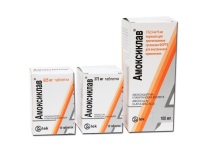 Amoxiclav
Amoxiclav
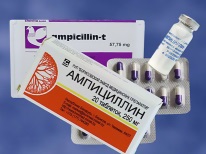 Ampicillin
Ampicillin
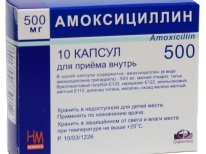 Amoxicillin
Amoxicillin
If the penicillins failed, and the child was not cured, or the young patient had recently been treated with antibiotics in this group, the doctor will prescribe macrolide antibiotics:
- Roxithromycin;
- Clarithromycin;
- Azithromycin;
- Sumamed.
![]() Roxithromycin
Roxithromycin
 Clarithromycin
Clarithromycin
 Azithromycin
Azithromycin
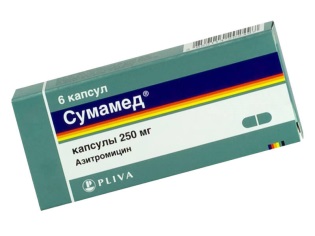 Sumamed
Sumamed
If the macrolides have not had the desired effect, or the child already has a rather advanced stage of sinusitis, the doctor will prescribe a medicine from the cephalosporin family of antibiotics. The child will have to take more "serious", but more effective drugs:
- Ceftriaxone;
- "Cefuroxime";
- Cedex.
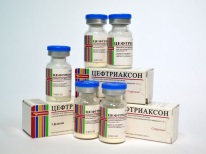 Ceftriaxone
Ceftriaxone
 Cefuroxime
Cefuroxime
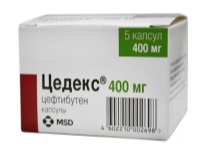 Zedox
Zedox
And very rarely in the treatment of child's sinusitis, doctors try to use antibiotics of the fluoroquinolone family. These are not children's antibiotics, but sometimes they are still prescribed to children after 5 years for the treatment of severe antritis caused by a blue pus bacillus:
- “Ciprofloxacin” (“Digran”);
- "Lomefloxacin".
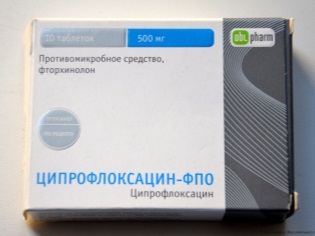 Ciprofloxacin
Ciprofloxacin
 Lomefloxacin
Lomefloxacin
All of the above is appropriate for situations where the child has acute forms of sinusitis. With chronic disease The use of antibiotics causes considerable doubts among scientists and doctors - it may happen that all antibacterial drugs will be tried, and the next exacerbation of sinusitis will have nothing to treat.
Drops and sprays for treatment
Local antibiotic treatment in the treatment of sinusitis in children is considered the most optimal solution.
After all, using the medication through the nose in the form of drops or spray, we significantly reduce the risk of the occurrence of such unpleasant consequences of taking antibiotics such as dysbiosis, thrush, allergic reactions. This for a growing body is definitely better. In addition, the antibiotic, delivered "to destination", to the site of inflammation, has a healing effect faster.
If the respiratory channel is open, then problems with the use of drops and sprays will not arise. If closed, the doctor may suggest a “puncture”, and then prescribe local antibiotics.
The most popular antibiotics local application are considered:
- Isofra. Potent drug with the antibiotic Framycetin is usually recommended for children from one and a half years. However, in some cases, "Izofru" may also be prescribed to younger children. An antibiotic is sold in the form of a spray in 15 ml vials. Also, the drug is available in nasal drops. Doctors emphasize that "Isofroy" can be treated for sinusitis, sinusitis, provided that nasal septum not damaged.
- "Polydex". This spray has both anti-inflammatory and bacterial effects. Antibiotics in the composition - "Neomycin" and "Polymyxin." It comes in the form of ear drops and nasal spray. Children are recommended from 2.5 years.
- "Bioparox" - an aerosol that improves the condition of the nasal mucosa. The antibiotic in the composition - "Fusafungin", the drug is prescribed to children aged 2.5 years. On sale "Bioparox" is in bottles of 20 ml. The drug has a significant list of contraindications.
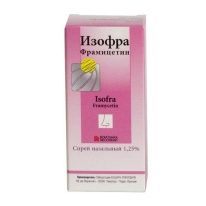 Isofra
Isofra
 Polydex
Polydex
 Bioparox
Bioparox
Most antibiotic drip forms and antibacterial sprays are contraindicated in children under 2–3 years of age. But in infancy, sinusitis is a rarity, since the final formation of the sinuses in children is completed only by 4 years. The most susceptible to sinusitis is children aged 7-10 years.
Complicated drops
“Complicated drops” in the nose were the only effective way to defeat sinusitis when my eldest son was undergoing treatment in his 12 years. After the tried and tested “fashionable” and rather expensive sprays, even after a course of antibiotics intramuscularly, he didn’t have a significant improvement. And “difficult drops” helped us recover.
“Complicated drops” is a drug that consists of several other drugs in the form of drops.Names, proportions and exact composition are prescribed by the doctor, and the drops themselves are manufactured by pharmacists in a pharmacy with its own prescription department.
Usually, the doctor resorts to the "difficult drops" when sinusitis is prolonged, recovery does not occur even after a course of therapy, or in case of a severe form of the disease.
Antibiotics are often used in “compound drops”. To keep such drops usually can not be long - about five - seven days.
About the treatment of sinusitis in children, about antibiotics, vasoconstrictor and complex nose drops can be found in this video:
Before applying the drops or spray, it is necessary to rinse the sinuses. For this fit saline solution (1 cup of boiled chilled water per 1 teaspoon salt), soda solution or sea water, furatsilina solution or a weak solution of potassium permanganate. At home, rinsing can be easily done with a rubber pharmacy pear. It is also possible to wash the sinuses with a syringe from which to pre-remove the needle. Pharmacies today are selling special devices for washing the nose.
After washing it is advisable to rest a little and drip. vasoconstrictor drugsif there is a feeling of congestion (ie, swelling in the nose). In a few minutes it will be possible to breathe and then you can already bury the drops and spray with antibiotics.
Antibiotics for inhalation in the treatment of sinusitis:
- "Dioxidin". In nebulizers, “Dioxidin” is used in the form of a special solution for inhalation. Such procedures can be performed for children who have reached the age of two. For children from 2 to 6 years old, inhalation should last 1 minute. Children from 6 to 12 years old - no more than two minutes.
- Ceftriaxone. In nebulizers use a dry mixture intended for injection. Bottle of 1 ml of drug + 5 ml of saline. The duration of inhalation for a child with antritis is no more than 4 to 5 minutes.
- "Streptomycin". Inhalations with this antibiotic for antritis are not recommended for children under 1 year of age. The duration of the procedure is no more than 3-4 minutes.
Features of treatment
- This can be done both in the hospital and at home. Heavy forms the disease is likely to require hospitalization and subsequent surgery.
- You can not change the dosage of the drug, interrupt the course of treatment even after a visible improvement in the child's condition. Unfinished sinusitis is likely to become chronic.

- It is strictly forbidden to warm the nasal cavities during sinus. Warm compresses and a hot-water bottle on the nose are sure to please the bacteria that have settled in the child’s sinuses. They will thank you. Any warming up for sinus will benefit only if there is no pus in the sinuses, and the treatment has reached the "finish line".
- While taking antibiotics in the treatment of sinusitis do not forget to give your child to drink the bacteriophages "Bifidumbakterin", "Bifiform" and others for the prevention of dysbacteriosis.
Sinusitis is a common disease characterized by inflammation of the mucous membrane of the maxillary sinuses and a strong pain syndrome associated with the appearance of congestion in the axillary cavities. This leads to the active growth of pathogenic microorganisms, as a result of which there is a high risk of damage to nearby tissues. That is why antibiotics are prescribed for sinus and sinusitis (simultaneous inflammation of several groups of the paranasal sinuses). Sinusitis and sinusitis - what's the difference?
The main goal pursued when taking antibiotics is the destruction of microflora created by pathogenic microorganisms. These drugs are prescribed for sinusitis of various types, but in each case the treatment system has its own distinctive features.
In acute processes, the patient is usually given a “shock” dose of antibiotics, but they are taken only 4-7 days. In case of chronic sinusitis the course of treatment with these drugs is increased several times and is about 10-14.
Antibiotics for sinus and sinusitis are taken not so much to eliminate foci of infection, but to prevent the development of serious complications against its background. At advanced stages of the disease, in addition to these drugs, other physiotherapeutic procedures are prescribed that contribute to the normalization of the outflow of mucus from the sinuses. In the absence of a positive result, a surgical method of treatment is used - a puncture of the paranasal sinuses.
Antibiotics for the treatment of sinusitis should be applied in accordance with the prescribed course. You can not make decisions about changing the dosage and duration of medication. This can lead to a sharp deterioration of health and the development of serious complications, such as brain abscess, meningitis, osteomyelitis and other serious diseases.
When it makes no sense to take antibiotics?
Sinusitis is a dangerous disease, which in 35% of cases is accompanied by complications. It is for this reason that his antibiotic treatment is always prescribed. The exceptions are:
- allergic sinusitis;
- chronic rhinosinusitis;
- inflammation of the mucous membranes as a result of sinus damage by yeast-like fungi.
 In addition, when viral diseases, proceeding in a mild form, taking antibiotics is also not prescribed, since in these cases the usual washing of the paranasal sinuses, inhalation and immunotherapy will help the adult to get rid of the symptoms of the disease.
In addition, when viral diseases, proceeding in a mild form, taking antibiotics is also not prescribed, since in these cases the usual washing of the paranasal sinuses, inhalation and immunotherapy will help the adult to get rid of the symptoms of the disease.
But when there is an acute process in sinusitis in an adult or child, accompanied by fever body intoxication of the body, pain and purulent secretions, taking these drugs is a must.
The main groups of antibiotics prescribed for acute sinusitis and sinusitis in adults
How to treat sinusitis in adults, you need to check with your doctor. All medicines that are listed below are described for informational purposes. To carry out their reception without the knowledge of the doctor is not permissible. The scheme and duration of antibiotics are prescribed individually.
Macrolides
Often, for the treatment of sinusitis in adults used drugs of this particular group. They block the growth and reproduction of pathogenic microorganisms in the body. The following drugs can be distinguished from the group of macrolides:
- Azithromycin - has antibacterial action and practically has not side effects, quickly eliminates the symptoms of the disease;
- Erythromycin is an antimicrobial agent with an average level of effectiveness; it can cause an allergic reaction.
Penicillins
 If the question arises, what antibiotics should be taken for antritis, a group of penicillins should be distinguished. These drugs practically do not cause side effects and are considered the safest. However, they have a narrow spectrum of action, since not all types of pathogenic microorganisms can have a suppressive effect.
If the question arises, what antibiotics should be taken for antritis, a group of penicillins should be distinguished. These drugs practically do not cause side effects and are considered the safest. However, they have a narrow spectrum of action, since not all types of pathogenic microorganisms can have a suppressive effect.
- Amoxicillin - is a semi-synthetic drug that is used for the inflammation of the sinuses caused by pathogenic microorganisms such as cocci and gram-negative rods;
- Augmentin is an antibacterial drug. wide spectrum actions, which, unfortunately, has a number of side effects, including dermatitis, gastrointestinal dysfunction, mucosal edema, etc.
Cephalosporins
Antibiotics of this group officially belong to penicillin group drugs. But in the fight against pathogenic microorganisms that provoke the development of sinusitis, cephalosporins are the most effective. From this group, you can select only one drugCeftriaxone, which is actively used for the treatment of sinusitis.
Drops with antibacterial action
In the treatment of sinusitis are often appointed drops in a room with an antibiotic. Their use in the early stages of the development of the disease avoids oral and intramuscular use of antibacterial drugs that can have a negative effect on the entire body.
In practice, doctors most often designate the following drops of antritis with antibacterial action:
- Isof;
- Bioparox;
- Polydex;
- Fuzofungin.
Spray from antritis with antibiotic Isof is considered the most effective. It has a pronounced antimicrobial effect, but can cause an allergic reaction.
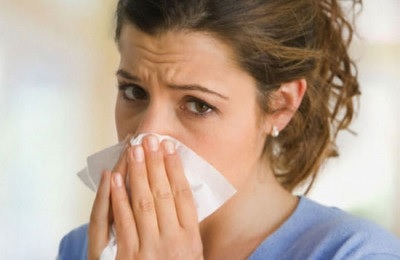 Choosing nose drops with an antibiotic, you first need to undergo a smear microscopy and a rapid assessment of the pathogen for Gram staining. Since the development of sinusitis can cause various pathogens that may have a high threshold of resistance to certain drugs. Therefore, without passing through these tests, treatment can sometimes not bring the desired effect.
Choosing nose drops with an antibiotic, you first need to undergo a smear microscopy and a rapid assessment of the pathogen for Gram staining. Since the development of sinusitis can cause various pathogens that may have a high threshold of resistance to certain drugs. Therefore, without passing through these tests, treatment can sometimes not bring the desired effect.
What is the best antibiotic of the above, hard to say. After all, their selection in each case occurs individually. Therefore, if you want to get rid of this disease as soon as possible, do not self-medicate, but rather seek medical help.
Antibiotics for sinusitis in children:
Popular
- Breast cancer is curable at any stage.
- The remedy for the cold Sinupret
- Azitrox - official instructions for use
- Chicken-bjaka: allowed antibiotics were found in Russian chicken
- Oral Cancer: Symptoms and Treatment
- Dark and thick blood during menstruation.
- Modern analogues of doxycycline tablets
- Is it possible to die from pneumonia
- What earwax will tell all about your health
- Tussin: instructions for use

